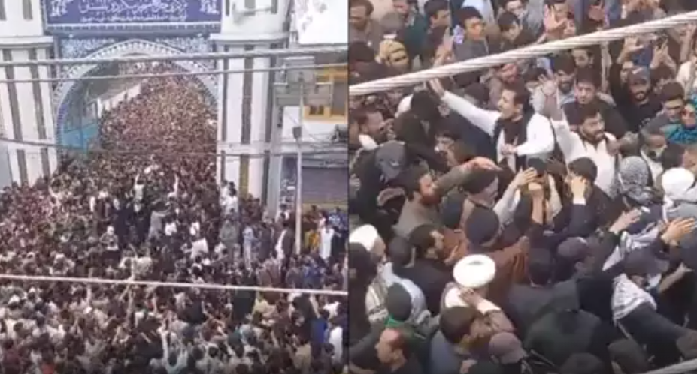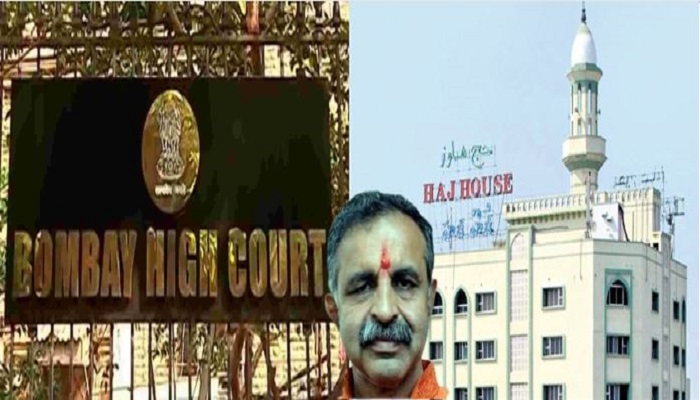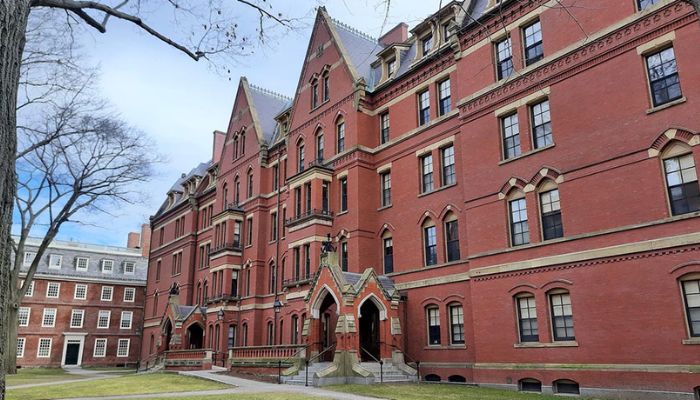Protests erupt in Gilgit-Baltistan over arrest of Shia Cleric for his ‘blasphemous’ remarks, threaten to merge with India

[ad_1]
Massive protests erupted on August 31 in Pakistan-occupied Gilgit-Baltistan over the imprisonment of a Shia cleric following Pakistan’s solidified blasphemy laws. The demonstrations are said to be the greatest in the region’s history, with slogans such as “Chalo, chalo Kargil chalo” being raised.
Local leaders in Gilgit have cautioned the Pakistan government of civil war, and some have even called for an association with India. According to the reports, Skardu locals protested after Shia cleric Agha Baqir al-Hussaini was booked and arrested for remarks made at a religious gathering.
Agha Baqir al-Hussaini was detained for his comments made at a Skardu Ulama Council meeting about Pakistan’s blasphemy laws being strengthened, ostensibly to target the Shia community. Islamic fundamentalism is shared by both Shia and Sunni Muslims, however, Shias do not revere religious personalities who challenged the fourth Caliph, Ali.
Highway connecting Pak-China blocked at multiple places in #PoK & #GilgitBaltistan as Shia-Sunni tensions rise after a top Shia cleric arrested for “disrespectful” comments about the Prophet
Blasphemy laws are an integrated tool to target minorities in 🇵🇰pic.twitter.com/CmziU4j07u
— Peerzada Azhar (@PeerzadaAzhar_) August 27, 2023
The majority of people in Pakistan are Sunnis, however, Gilgit-Baltistan contains a sizeable Shia population. Starting with Gen Zia-Ul Haq’s administration, successive Pakistani governments made an effort to change the ethnic composition of Gilgit-Baltistan by moving Sunnis there.
Baltistan, Diamer, and Gilgit are the administrative divisions of the Gilgit-Baltistan area. Gilgit and Skardu are the primary administrative centers.
Locals say will go to Kargil instead of Punjab, Sindh in Pakistan
Despite the fact that the protests in Gilgit have received no attention from the Pakistani media, several photos and video instances have emerged on social media, demonstrating the magnitude of the discontent.
Several reports suggest that the initial protest began on August 22 by Sunni community people who demanded the arrest of Agha Baqir al-Hussaini. The protesters in Daimer are said to have blocked the Karakoram Highway that connects the region to Pakistan.
فَرَازِ دَار سے مِیثَم بیان دیتے ہیں
رہے گا ذِکرِ علی(ع)، ہم زبان دیتے ہیں#Skardu #GilgitBaltistan pic.twitter.com/KqWYpYYukj— Ali (@m3khr) August 25, 2023
Shias have now begun putting out demonstrations as a reaction to those protests and the arrest of cleric al-Hussaini, videos of which are currently being circulated on X.
Looks #GilgitBaltistan sectarian divide is not going to calm soon. pic.twitter.com/OnuQGBIybq
— 🇵🇰Frankly Speaking (@occupiedbypak) August 25, 2023
In the videos, protesters can be heard yelling anti-Pakistan slogans and also slogans criticizing Pakistan Army Chief General Asim Munir.
Local leaders also appear in videos saying that if the route remains closed, people will make their way to Kargil rather than Punjab or Sindh of Pakistan, referring to merging Gilgit with India. They also threatened civil war if their demands for the release of al-Hussaini and the opening of the roadway were not met.
We will welcome you with open arms 💚 #GilgitBaltistan #Insolidarity_AghaBaqir pic.twitter.com/VF5AUtNjKN
— Sajjad Kargili | سجاد کرگلی (@SajjadKargili_) August 29, 2023
Blasphemy law targets Shia; What Hussaini said?
In January, Pakistan amended its already stringent blasphemy laws, extending them to penalize anyone who offends persons associated with Prophet Muhammad. The change now makes insulting the Prophet Muhammad’s associates, which included many early Muslims, a crime. One of them is Yazid, the source of controversy in this case.
In his speech, Al-Hussaini allegedly insulted Yazid, son of Muawiya, which led to the blasphemy allegations against him. At Yazid’s command, Hussain (the Prophet Mohammed’s grandson) was killed in the Battle of Karbala.
Shias do not hold figures like Yazid in the same regard as Sunnis do because they mourn Hussain’s martyrdom in the month of Moharram. That is the reason why Moharram is a sensitive topic in places where Shias and Sunnis live together.
The minimum punishment for insulting prominent figures of Islam in Pakistan has recently been doubled under an amended law from three to ten years in prison and a fine of one million Pakistani rupees. Further blasphemy is an offense that cannot be banished on bail under the most severe punishment, which is a life sentence.
Protesters say Hussaini will never apologize for his statement
The blasphemy laws had already been altered to specifically target Ahmadis, who had already been labeled as non-Muslims. However, now the protesters say that the laws have been amended to specifically target the Shia community.
The protesters demanded the withdrawal of the FIR against Hussaini and also stated that he would not apologize for his statement.
The cleric previously had claimed that he would never seek forgiveness, no matter how many FIRs are filed against him, or if he gets detained or assassinated. The demonstrators stated that if the authorities cannot make the highway to Punjab accessible, they will not travel there and instead requested that the road to Kargil be opened.
A Local activist of Skardu is raising concerns regarding recent protests on KKH Chilas
He addressed Pakistan” If you create trouble for the citizens of this disputed region #GilgitBaltistan, then we don’t want connectivity with #Pakistan. Open the way to Kargil for us… pic.twitter.com/1Xq6WfVWCj— Naveed Murtaza (@NaveedMurtaza11) August 25, 2023
Following communal tensions, the administration has decided to keep all educational institutions in Skardu closed. Many tourists have been stranded as a result of KKH’s closure. The highway is being reported to be open on social media, but it is still not fully operational, and the situation remains tight.
[ad_2]
Source link



